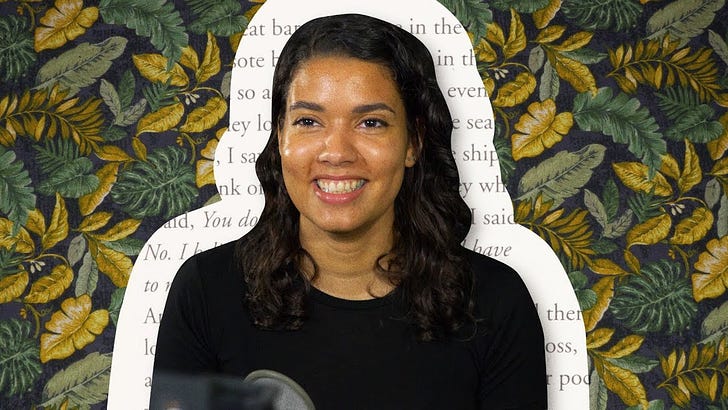Hi there. I was planning to write a goofy newsletter all about television shows but then yesterday morning I was in the bookstore reading poems and crying and thought, no, that’s better. So this is going to be about sad poems. Not just sad poems—death poems.
Even within the subsection of sad poems that is death poems, there are so many kinds! Dead mother poems, dead father poems, dead husband poems, dying self poems! I wanted new poems—I love Saeed Jones’s poems about his mother, and Tracy K. Smith’s poems about her father—but I wanted ones that I hadn’t read before. I sat there on a little wooden stool in front of the poetry shelf and read one book after the other.
You may know Margaret Atwood as the author of The Handmaid’s Tale and a thousand other books, but I like her best as a poet. She is plain spoken and careful and deliberate and often funny. I read three of the poems in her newest book, Dearly, to my kids last night and they were rapt, and silent, at least until one of the poems used the word ‘shit,’ and then they were back to their hysterical selves. I asked them to give a thumbs up, a thumbs sideways, or a thumbs down, and the poem “Invisible Man” got thumbs ups across the board. Here is the first bit, and you’ll immediately understand why:
It was a problem in comic books:
drawing an invisible man.
They’d solve it with a dotted line
that no one but us could see,
You see it all in that first stanza—the person who will be missing, the person who's missing is felt and seen. (Atwood’s partner died in 2019, after living with dementia for some time. Missing the person who is still there, indeed.) And in the language my children already speak, the language of comic books. Sob.
Then I read Ada Limon’s Bright Dead Things—look, death is right there in the title—and though I read the book as more about love (romantic love, marital love, ruined love) than physical death, there was one poem, “What It Looks Like To Us And The Words We Use” that really got me, in part because in thinking about my father, I think so much about art and words and communication. Talking about god—the idea of god—makes me feel squeamish, but this poem really beautifully describes the feeling of connection. It doesn’t claim to be a poem about art, or writing, but it is about language and connection and clouds of understanding and it made me cry. Here is a video of Taylor Behnke reading it.
Lastly, I picked up Tony Hoagland’s Turn Up the Ocean. Hoagland died in 2018, and “In the Beautiful Rain” is one of the best and most joyful end of life poems I’ve ever read—according to the Sun’s website, they finalized the proofs the day before he died. He was only sixty-four. You can read the full poem here (scroll down, it’s the second one), but here’s what I love about it—it takes issue with the causes of death listed after one’s demise, and offers other avenues instead—such as:
Let us say, “In broad daylight,
Ms. Abigail Miller
conducted her daring escape
before life, that crook,
had completely picked her pocket.”
Let us all go into death (and therefore the rest of our lives) with humor, with amazement, with magic, and with poetry. Right?
I used to write poems all the time—every day, all day long, every second I was alone. I was also a good smoker at the time, and I suppose just liked having someone to do with my hands. I wonder how many poems the iPhone has stolen from the world. In any case, I wrote a poem a while ago about causes of death, and so here it is. I can print the whole thing, because who’s going to stop me? I’m a little rusty but who cares. With a deep bow to Lucille Clifton for the line that inspired this poem:
come celebrate
with me that everyday
something has tried to kill me
and has failed.
Dang, right? Dang. Okay, here’s my poem.
All the Things that Didn’t Kill My Father
after Lucille Clifton
Emma Straub
The car that ran him over when he was seven,
The man who touched him in a movie theater,
Wine vodka Fiddle Faddle tobacco
And the hidden contents of his desk drawers.
The two-seater champagne-colored Mercedes
The slick and verdant country roads.
New York City in the 1980s.
My patient mother.
The Concorde, which no doubt could have
Exploded in half the time.
The QE II, which could have found
Its own iceberg. Connecticut.
Midwestern prep school
fascists. His father.
A shadow, a doppelganger, himself.
The weight of my earnest affection.
When the newspapers print
The cause of death, they should list
Everything that failed.
On his outgoing message, he still says
Be succinct, but I find that I cannot.
There is always more to say.
Thanks for reading poems with me today.



Emma, have you read any poems by Max Ritvo? He was writing his thesis at Columbia right before he died of Ewing's sarcoma. Brilliant writer, highly recommend if you haven't read him. Sarah Ruhl wrote a book of their letters together, "Letters From Max" that is being made into a play that is debuting soon. I think you'd like it!
"The weight of my earnest affection." You got me there. And your book - the astonishing miracle of 'This Time Tomorrow.' For some weird reason I thought of you last night and wondered where you were at in your grief. I remember wishing we still could wear black arm bands when my dad died, so people would just know. Sending a hug your way...